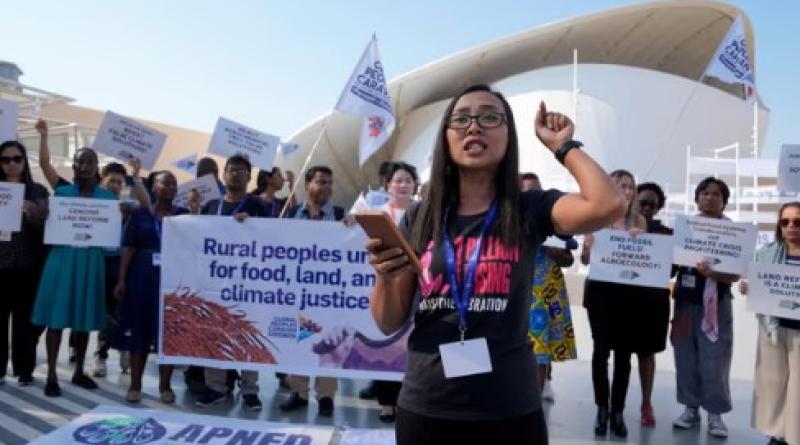Big meat and dairy lobbyists turn out in record numbers at Cop28

Lobbyists from industrial agriculture companies and trade groups have turned out in record numbers at Cop28, with three times as many delegates representing the meat and dairy industry as last year.
Representatives are present from some of the world’s largest agribusiness companies – such as the meat supplier JBS, the fertiliser giant Nutrien, the food giant Nestlé and the pesticide company Bayer – as well as powerful industry lobby groups.
Meat and dairy are particularly well-represented with 120 delegates, but an analysis of the list of delegates by DeSmog shows that the number of lobbyists representing the interests of agribusiness more broadly have more than doubled since 2022 to reach 340.
In addition, the analysis reveals that more than 100 delegates have travelled to Dubai as part of country delegations, which grants privileged access to diplomatic negotiations. This number is up from 10 in 2022.
Meat and dairy firms in particular are coming under increasing scrutiny due to pollution from livestock, which emits about a third of the global output of methane, a short-lived greenhouse gas, the cutting of which is identified as the quickest route to slowing global heating.
Ben Lilliston, of the Institute for Agriculture and Trade Policy, said: “With greater scrutiny over emissions from meat and dairy companies, it is not surprising they are stepping up their game to head off any Cop outcome that might hinder their operations. Even so, a tripling of delegates is alarming – it drives home the urgent need for reforms that limit corporate influence at UN climate meetings.”
Meat is not the only industry under the spotlight. Farmers, retailers and processors also drive greenhouse emissions by clearing trees, using fossil-fuel-derived synthetic fertilisers and in transport, packaging and storage.
Karina Gonçalves David, a small-scale farmer representative from Brazil, is concerned by the presence of powerful and polluting firms. “If they are inside, they have an advantage. This place is about solutions to face the climate crisis but the companies are appropriating it to do lobbying. They are going the opposite way.”
The world’s top five meat companies’ emissions are estimated to be significantly larger than those of the oil firms Shell and BP, while the dairy industry’s 3.4% contribution to global human-induced emissions is a higher share than aviation.
Outspoken meat lobby groups are also on the ground in Dubai, including the North American Meat Institute, which as recently as 2022 claimed the extent of human-made climate breakdown was “unknown”.
Producers of pesticides have also turned out in high numbers this year, up 30% compared with 2022. Together, Bayer, Syngenta, BASF and their trade association, CropLife, which has pushed back against attempts to enact new climate measures, sent 29 delegates.
The synthetic fertiliser industry has also had a steep rise in representatives ,with 40 this year, up from 13 in 2022.
Raj Patel, of the sustainability thinktank IPES-Food, said: “Just as with the influx of oil lobbyists, industrial agriculture businesses are scared. They have read the science and they know how much their business has driven the climate crisis.”
Big food and farming representatives are keen to steer conversations away from dietary change, which is under discussion at the summit. On Sunday, the UN’s Food and Agriculture Organisation will release the first draft of its plan for achieving a sustainable global food system, which is expected to call on rich nations to cut meat consumption.
This follows the recommendation of the Eat-Lancet Commission, which suggests people consume no more than 15.7 kg a year. In 2020, the average American consumed 126kg of meat.
Smallholder farmers are worried they will be sidelined by the power of the agribusiness lobby. A recent report showed small-scale producers get just 0.3% of international public climate finance despite producing a third of the world’s food.
“Family farmers are already rolling out more diverse and nature-friendly practices, which the UN’s Intergovernmental Panel on Climate Change says is needed,” said Esther Penunia, the secretary general of the Asian Farmers’ Association, an alliance of organisations representing 13 million family farmers. “Yet our concerns, and the solutions we are putting forward, are being drowned out. We struggle for our voices to be heard above the voices of those with more money and more power.”
Most corporations, lobby groups and NGOs that attend the Cop climate summits have “observer” status, but the analysis shows an increase in the number of industry representatives attending Cop28 with their national governments, making companies and lobby groups party to diplomatic negotiations.
Participating as country delegates, says Nusa Urbancic from the Changing Markets Foundation, means that industry may be perceived more as peers by policymakers who then give greater credibility to their positions.
In total, 102 industry representatives are in Dubai as part of country delegations, 30% of the sector’s total. In 2022, they made up less than 6%.
The highest numbers of agribusiness representatives were brought in by Brazil, with 36 delegates linked mostly to the meat industry. Next in line was Russia, which handed out 15 passes to people affiliated with fertiliser companies and lobby groups, followed by Canada, which offered tickets to eight more delegates from fertiliser firms.
Fabrício Muriana, from Brazil’s Instituto Regenera, who is attending as an observer with the Global Alliance for the Future of Food, said: “They are here because they knew it would be a food Cop. It’s a cynical move because these people are not even beginning to scratch the surface of reducing harm, let alone addressing climate. We need stricter criteria on who is coming, and with what intentions.”
Big food companies have announced a handful of voluntary initiatives at Cop28. One is the UAE- and US-led Aim for Climate partnership, which has been criticised for skewing heavily towards techno-fixes and the commercial interests of large corporations.
At the summit, six of the world’s largest dairy companies also committed to disclose their emissions, but fell short of setting targets to cut the sector’s methane pollution, which accounts for 10% of the global total. Campaigners point out that the dairy industry has plans to grow by more than 70% in the next decade.
The new analysis gives only a snapshot of the industrial agriculture sector’s influence. Agriculture and trade ministers, which fell outside the scope of the analysis, have been fierce advocates for the interests of agribusiness at UN events in recent years.
Government officials from Brazil and Argentina – both big producers of beef – pushed to water down scientific recommendations about reducing meat-eating in the latest IPCC report.
The US agriculture secretary, Tom Vilsack, a former dairy lobbyist, told industry groups before Cop28 that the US would use the summit to advocate for its market-based approach to agricultural policy, which shuns calls for regulation of industries such as meat and dairy.





